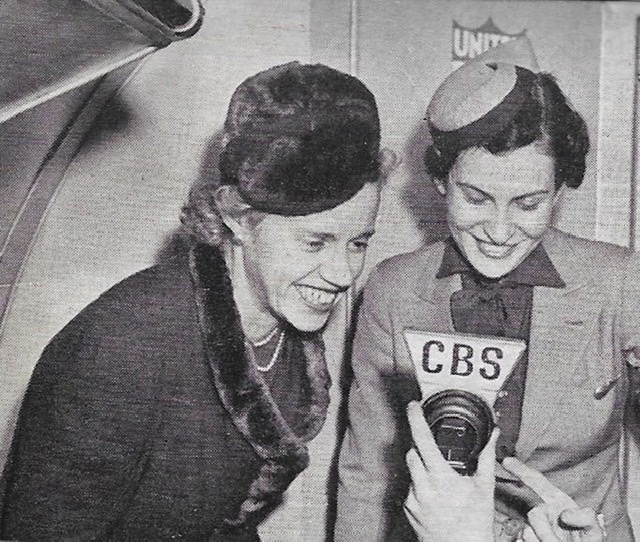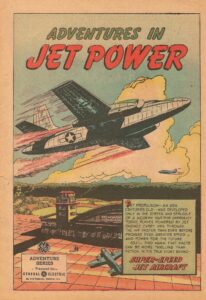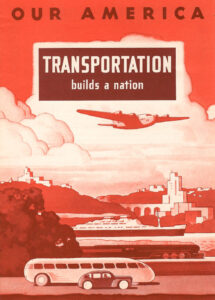So far we have followed Polly, a fictional air stewardess, as she got her passengers ready for a night flight across the country. Then pampered them while in the air. Now in this CBS transcript of Americans at Work, we meet two real life stewardesses who share their insights about their job during the dawn of commercial aviation in the US.
So, buckle up and let’s return to the friendly GVS skies
=======================================================================
Somewhere over America tonight there are many stewardesses flying through the night to meet the dawn. A little later on in the program, we’re going to talk with a real air-stewardess in a plane coming into Newark Airport. But first, we’ve grounded here in the studio one of the most efficient air stewardesses in the business. As a matter of fact, the particular young lady we’re talking about is one of the four Chief Stewardesses of the United Airlines, and her name is Miss Marie Hess—a very personable young lady with blonde hair and a very charming smile.
Miss Hess, if you don’t mind, I’d like to ask you some questions. First of all, where do you come from?
HESS: Tonganoxie, Kansas.
ANNOUNCER ALLEN: Well, how’d your folks take to your flying?
HESS: They didn’t like it at all at first, but after receiving many letters from me, filled with all of my interesting experiences—letters on aviation and all kinds of literature—they decided to listen to me for a change. I must enjoy my work and what more could they want?
ANNOUNCER ALLEN: Well, not very much. Have you ever gotten them to try flying?
HESS: I certainly have! Last month, after six and a half years of constant persuasion, my father made his first trip from Chicago to New York and return.
ANNOUNCER ALLEN: Did he like it?
HESS: He loved it.
ANNOUNCER ALLEN: Now he doesn’t blame you for taking it up, does he?
HESS: I should say not.
ANNOUNCER ALLEN: How far have you flown, Miss Hess?
HESS: Over one million miles, or 165 coast-to-coast round trips.
ANNOUNCER ALLEN: Rapid mathematician. How long after you became a stewardess did you become Chief Stewardess?
HESS: Well, I was fortunate—it was only about a year and a half.
ANNOUNCER ALLEN: Miss Hess, I’ve often wondered whether folks like you air-stewardesses have any hobbies—whether you have time for any.
HESS: I should say we do. We always find time for hobbies, such as horseback riding, dancing, sewing. Last, but not least, I love flying, with all of its duties.
ANNOUNCER ALLEN: That’s real pleasure, when your actual work is a hobby. Miss Hess, what duties comprise your job?
HESS: Well, first I interview the applicants; then I hire some of them, and then I make observation trips with each girl and observe her duties in action. When she’s taking care of the passengers, I like to know how she greets them as they enter the door, and how she goes about taking care of them in fastening their seatbelts, passing out the gum, and how she arranges her food in the lunch-boxes served to the passengers. Then I check her report; this means checking all of her manifests, such as the listing of passengers and her tickets, so that she doesn’t repeat an error.
ANNOUNCER ALLEN: That’s a lot of work; I don’t see how you have time for those hobbies you mentioned a moment ago. Well, talking about new stewardesses and watching them, how do you choose your new stewardesses?
HESS: Well, of course, we choose them by their personal appearance and all of the exacting qualifications that a graduate nurse should have. And we do like to have them interesting personalities.
ANNOUNCER ALLEN: How many new stewardesses do you employ in a year?
HESS: I employed about seventy girls last year.
ANNOUNCER ALLEN: Why did you take that many?
HESS: We have additional schedules in Spring; we must have new girls for these schedules. And of course Dan Cupid slips along now and then and takes a girl.
ANNOUNCER ALLEN: He doesn’t even stop in the air, does he?
HESS: Certainly does not!
ANNOUNCER ALLEN: Do you have difficulty finding proper applicants?
HESS: No, we do not. We have had in the past, but we are working along with the hospitals now and they know the type of girl we’re seeking, and they assist us in choosing the proper girls.
ANNOUNCER ALLEN: Where do you look for possible stewardesses?
HESS: We look for them all over the United States. We go to the smaller cities as well as the larger cities. We usually write to different hospitals and say that the Chief Stewardess is coming in in a short time. We give them the date, and then they have the girls all ready for us to be interviewed.
ANNOUNCER ALLEN: There’s one more question I want to ask you, Miss Hess. Why does your company feel that girls are better than men for this particular work?
HESS: Well, we feel that girls are better than men because they can assure the women that flying is the thing to do; it’s safe, it’s clean, it’s swift, and it’s comfortable. And then too, many mothers like to travel with their children, and the stewardess can assist the mothers with their babies so that the women can enjoy their trips and get some rest. Then too, women as well as men like that “feminine touch.”
ANNOUNCER ALLEN: With that, Miss Hess, I want to thank you for coming over and answering a few of these pertinent questions about air-stewardesses. You’ve been listening to Chief Stewardess of the United Airlines, Miss Marie Hess. Thank you, Miss Hess. And now, we’d like you to meet a stewardess actually at work. We’re going to try to call in the United Airlines’ Mainliner flying some 8,000 feet in the darkness above us this very minute.
Calling Trip Ten. Columbia Studios calling Trip Ten.
(ANNOUNCER JOHN REED KING): This is Trip No. 10 reporting to CBS from the air lanes of the airplanes. Good evening, ladies and gentlemen. We’re riding in drawing-room comfort in a huge United Airlines’ transport, more commonly known near and far as a United Mainliner. Seated as we are in our individual restful chairs, we can look out the Mainliner’s windows and down upon the brilliantly lighted towns and villages of Long Island, over which we’ve been flying. Where we are exactly at this moment, I cannot say, but at our elbow is the stewardess, whose inexhaustible knowledge of such matters can easily pour forth the required facts. Miss Vera Vogel, where are we?
VOGEL: We’re over Freeport, L. I., we’re 2,000 feet above the sea level, 1,990 feet above the ground, our air sped is 185, our ground speed 210. The flight-level temperature is 60° Fahrenheit, in Newark it’s 62° Fahrenheit and we will arrive in Newark at the end of this broadcast.
ANNOUNCER KING: Thank you very much, Miss Vogel. And now I’d like to meet the young lady who wrote the dramatic portion of this broadcast that we heard just a few moments ago: Miss Margaret Lewerth. Miss Lewerth has become so interested in your work, just from her research on the subject, that even though flying is one of her newest experiences, she’s up here with us tonight to ask you a thousand questions. And so I leave it to you ladies. Miss Lewerth:
LEWERTH: Thank you, Mr. King! As this is my first interview and almost my first flight, I’m going to leave it up to our air-stewardess. Let me describe her. She’s just under the specifications 5 feet 4 inches tall; she has dark curly hair and a delightful smile. She wears a light grey uniform and on her cap and lapels are the tiny silver wings that tell her profession. Her name is Vera Vogel. Miss Vogel, the first question every one wants to know is how did you happen to become an air-stewardess?
VOGEL: I wanted to become an air-stewardess because I thought it would be a lot of fun to meet people and travel from one place to another—in this city and that city, all in a big hurry.
LEWERTH: What did you do before you took up this work?
VOGEL: I was a nurse in a dental office.
LEWERTH: Had you ever flown before?
VOGEL: No, I had never flown up until my first week in school.
LEWERTH: Heavens, that was quite an experience. Tell me, where do you come from?
VOGEL: My folks live in Marion, Indiana.
LEWERTH: How does your family feel about your taking up this occupation?
VOGEL: Well, my family always want me to be happy, and anything I like to do, they say is all right.
LEWERTH: Well, that’s splendid. Tell us, how many miles have you flown now?
VOGEL: I’ve flown over a hundred thousand miles.
LEWERTH: And what is your route?
VOGEL: My route is Chicago-New York.
LEWERTH: How many days a week do you work?
VOGEL: I make two round trips a week; consequently, I fly approximately four days.
LEWERTH: Well, that leaves you three nights at home. Where is your home town?
VOGEL: I’m based in Chicago.
LEWERTH: With your family?
VOGEL: No, I live with three other stewardesses in a house.
ANNOUNCER KING: I wonder whether I can jump in here and ask you what your hobby is?
VOGEL: Oh, my hobbies are riding horseback and swimming and playing tennis, and just lots of things.
LEWERTH: To go back to the job, Miss Vogel, what kind of unusual request do you get on this job? There must be many questions that passengers ask you.
VOGEL: Well, one of the funniest problems I’ve ever had was a man that asked me to help him put on his shoes.
ANNOUNCER KING: Help him put on his shoes?
VOGEL: Yes. He was struggling away, and he said that his feet were just too large for the shoes, and he wanted me to help him.
KING: What did you do?
VOGEL: Well, I measured his feet, looked at the shoes, and sure enough the shoes were too little.
ANNOUNCER KING: What was the cause of that— shrinkage?
VOGEL: It seems that the passenger who was sleeping in the lower berth, below him, had gotten up and put on the wrong pair of shoes. And he was wandering around Cleveland in somebody else’s shoes, and this man was in New York without his shoes. We had an awful time.
ANNOUNCER KING: How did you finally settle it? Did you get his shoes back for him?
VOGEL: Yes, we did. We wired Cleveland. Meanwhile the other man had discovered that he had the wrong shoes, and within six hours we had the shoes back, and everybody was happy.
ANNOUNCER KING: That’s a happy ending to such a misadventure. Now, Miss Lewerth, I see you have something you want to ask.
LEWERTH: From a feminine point of view I’d like to know something: those smart-looking uniforms you wear, Miss Vogel, must save you a lot on clothes. Is that so?
VOGEL: Well, they save us a lot on our street clothes, but we buy our own uniforms.
LEWERTH: Would you mind telling the radio audience what a uniform like that costs you?
VOGEL: Well, our uniforms complete costs us over a hundred dollars. That includes purse, shoes, overcoat and all the accessories a girl might want with her uniform.
LEWERTH: You must meet a lot of interesting people on these trips?
VOGEL: Oh, yes! We do meet a lot of interesting people. We’ve had as our passengers J. Edgar Hoover, Mrs. Franklin D. Roosevelt, Andre Kostelanetz, Gene Raymond—just lots of others.
LEWERTH: Miss Vogel, there must be one question that all your friends are anxious to know when you come back from a flight. What is it?
VOGEL: Well, they all want to know if I’m frightened.
LEWERTH: Well, are you?
VOGEL: No, never.
LEWERTH: And what sort of questions do the passengers most frequently ask you?
VOGEL: What altitude are we flying—just as you did.
LEWERTH: Thank you very much, Miss Vogel. You’ve made my first interview, as well as my first flight, very pleasant.
ANNOUNCER KING: Well, for Miss Lewerth, our millions of listeners and yours very truly, John Reed King, that was a splendid personal picture you sketched for us of the airline stewardess at work, Miss Vogel, and we want to thank you again. And so saying, ladies and gentlemen, flying through the night over Long Island, we figuratively drop out of the air from this huge United Mainliner and return you now to our new York Studios.
ANNOUNCER ALLEN: You’ve been listening to Americans at Work, the program about you and what you do for a living, presented each week at this time by the CBS Department of Education. Tonight’s program, The Airline Stewardess, was written by Miss Margaret Lewerth and directed by Brewster Morgan. The Workers’ Education Bureau of America and the Radio Committee, National Vocational Guidance Association, collaborate on research for the entire series of broadcasts.
This is the Columbia . . . Broadcasting System.
END OF BROADCAST
================================================================
Wasn’t that fantastic? AMERICANS AT WORK was a series started by Columbia Broadcasting System on April 28, 1938. According to the last page of the transcript, they did episodes on a wide variety of professions. Everything from a milkman, to a submarine worker, to a silversmith. I haven’t been able to locate any more transcripts for sale, but you can bet I’ll be keeping an eye out, because the records of these broadcasts are truly Glorious Vintage Stuff!



